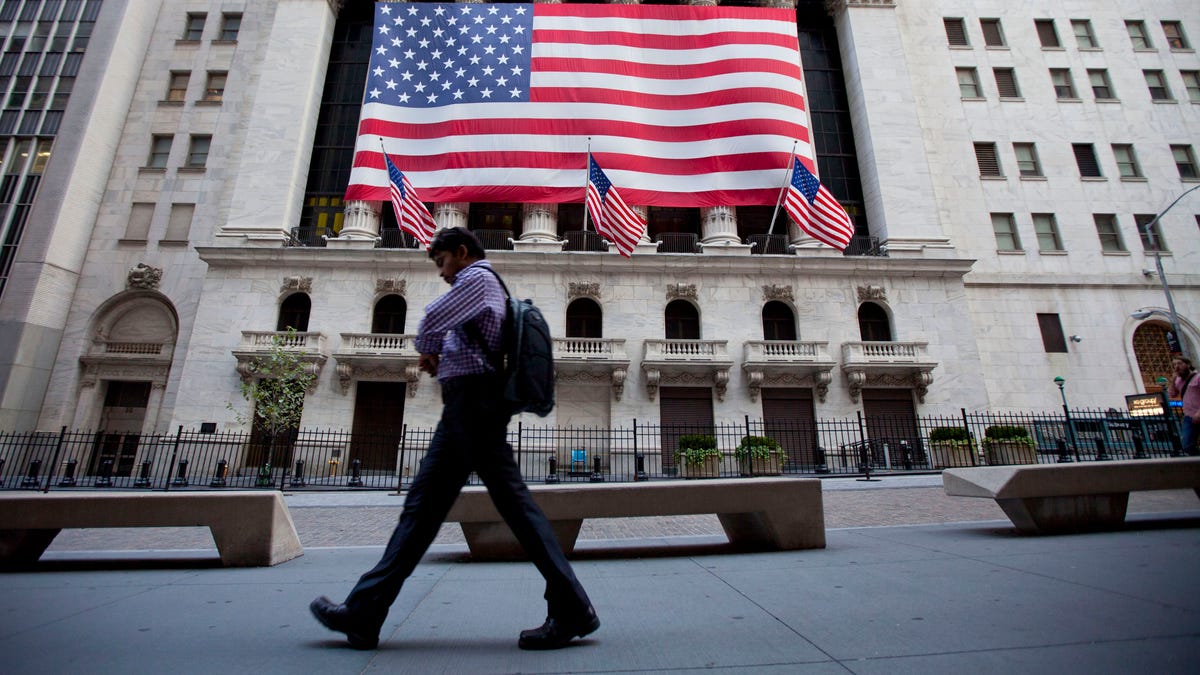
File: In this Aug. 5, 2011, photo a pedestrian walks past the New York Stock Exchange in New York. (AP2011)
Standard & Poor's faulted political entrenchment in Washington for this weekend's U.S. credit rating downgrade, but it was lawmakers on Sunday bickering over S&P's move that provided insight into how such a decision could be reached.
"I believe this is without question the Tea Party downgrade," said Sen. John Kerry, D-Mass. "This is the Tea Party downgrade because a minority of people in the House of Representatives countered even the will of many Republicans in the United States Senate who were prepared to do a bigger deal."
"I agree that there is dysfunction in our system, and a lot of it has to do with the failure of the president of the United States to lead," responded Sen. John McCain, R-Ariz. "The fact is that the president never came forward with a plan. I was gratified to hear that he had plans, but it was never a specific plan, it was always the so-called leading from behind."
On Friday, S&P lowered the credit rating from AAA to AA+, it said, because Congress and the administration were too partisan to get anything done that would significantly improve the nation's debt outlook.
"The political brinksmanship of recent months highlights what we see as America's governance and policymaking becoming less stable, less effective, and less predictable than what we previously believed," S&P said in its announcement.
"The downgrade reflects our view that the effectiveness, stability and predictability of American policymaking and political institutions have weakened at a time of ongoing fiscal and economic
challenges," the announcement continued.
For Democrats, blame lies with Republicans who refused to allow tax increases.
"We need a balanced approach. And the extremism, the Tea Party obstructionism here in Washington, is keeping us from restoring that balanced approach that America has always used of investing in the future, investing in job creation, and also being fiscally responsible at the same time," said Maryland Gov. Martin O'Malley.
"'Raising taxes' is what 'balanced plan' means. That's plain to every American by now," countered Sen. Jeff Sessions, R-Ala., who appeared with O'Malley on ABC's "This Week."
"The administration wants to raise taxes so they can permanently implant a larger level of spending. They've increased domestic discretionary spending 24 percent in two years. This is unthinkable," Sessions said.
"I think this is [the] Tea Party's problem. I think they're totally unreasonable and doctrinaire and not founded in reality. I think they've been smoking some of that tea, not just drinking it," former DNC Chairman Howard Dean said on "Face the Nation."
Kerry argued that if some Republicans are willing to default in order to reduce the size of government, then they are responsible for the downgrade.
"There were some people in the Republican Party -- and (Senate Republican leader) Mitch McConnell even admitted this -- who wanted to default. He said there were people in this party who are willing to shoot the hostage. In the end they found the hostage was worth ransoming. This is not about ransom, this is about our nation," Kerry said.
But McCain, who followed Kerry on NBC's "Meet the Press," said comments like Kerry's aren't going to increase solidarity.
"Talking about hostages? Lately the Democrats have been calling us terrorists. So, we need to lower that level of rhetoric obviously," he said.
Rep. Charlie Rangel, D-N.Y., acknowledged that dysfunction in Washington could lead investors to think the U.S. is not a safe spot for their cash.
"Had they seen that internal political struggle where certain people wanted to prove their strength by threatening and putting us on the brink of economic destruction you can not blame somebody for saying our markets are not as stable as they should be," he told Fox News.
Rangel, who clearly faulted opponents of tax hikes for the intransigence, said Washington will continue to be the problem "unless common sense enters the picture."
Anytime you owe as much money as we do, it's abundantly clear that you cannot just cut your way out of it," he said. "We can't say all of it is going to be taxes, and Republicans can't say all of it has to be cuts. We have to come together as a family and say we need both."
One area of agreement in Washington is the low expectations of the select committee of 12 lawmakers tasked with finding additional balance in the budget.
"I do believe that committee can function and be successful in the limited goal we've given them," said Sessions, ranking member of the Senate Budget Committee. "What S&P is saying, it's not enough. It's only about $2 trillion, a little over, when we're going to increase our debt in the next 10 years $13 trillion. So that's why they're concerned. Even the plan is insufficient if successful."
People "get another crack at this thing in 2012 and that's a new Congress and a new ball game," Rangel said. "So having 12 people that you and I don't even know who they are from the House and Senate determine the economic destiny of the United States of America to me is a complete forfeiture of our responsibilities as members of Congress. I am awkwardly embarrassed."












































